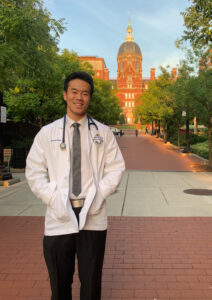Takeaway
A caregiver’s compassion-fatigue affects the patient. Caregiver support should be considered in the treatment plan.

Lifelong Learning in Clinical Excellence | September 8, 2022 | 2 min read
By Howard Chang, Medical Student, Johns Hopkins Medicine
As medical students, many of my peers and I can recount transformative moments with patients that have guided our vocational pursuits, including our chosen specialties. Our patients inspire, challenge, and refine us. They help us discover great needs within medicine that we may not have otherwise appreciated.
Less often do such defining instances centralize not the patient, but the person sitting next to them: the caregiver. More unusual is that a caregiver’s silence can be the transformative moment that helps a trainee discover their passion and place within medicine, as it did for me.
She was both the spouse and caregiver of a 50-year-old man rendered severely and permanently disabled by multiple system atrophy, a progressive, incurable, and dehumanizing neurodegenerative disease. She remained silent, except to share her hometown when I tried to make small talk. Her face revealed a despairing spouse who never signed up to be a 24/7 caregiver for her previously robust husband. I sensed she believed this appointment was for her husband, as it was, but that it was strictly so–that there was no room to engage with her suffering, when in comparison her husband’s appeared so much greater. Her reticence to talk, even with the physician, perplexed and affected me deeply. I feared what thoughts she harbored. Her silence pierced me more than words could.
My lasting regret, which I reflect on often, is that I wasn’t courageous enough to ask her about her own pain. What might she have said? What help might she have received that day? She was in plain sight; how could I have forgotten her?
I saw many people with neurodegenerative disorders that month on my neurology clerkship. All but one presented with a caregiver–usually their spouse, sometimes children or friends. I realized that caregivers are extensions of patients, and as such, patients themselves. Their well-being impacts patients, and their burnout means poorer patient care. I now believe that when appropriate, caregiver support should be considered in the patient’s treatment plan.
These patients and their caregivers moved me to pursue neurology, that I may care for patients with severe disabilities caused by brain diseases and study and apply ways to ease their suffering. More importantly, they spurred me to become a physician who notices and addresses the often-overlooked ways that patients hurt. None of us should have to look very far, just closely.
This piece expresses the views solely of the author. It does not necessarily represent the views of any organization, including Johns Hopkins Medicine.

